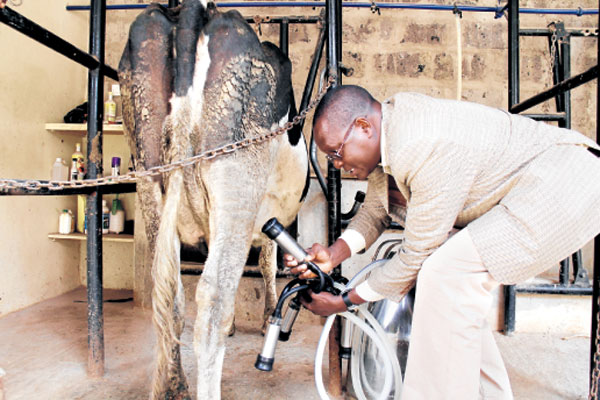Profitable Dairy Farming: In 2004, some two years before leaving work at the Maritime Police Unit, his last posting, Albert Miare began planning for his retirement after 37 years in the service.
Owning two acres in Kasarani where his home is also located, farming was the viable option for him. He started with a heifer his cousin offered him, and added two others, with the herd growing over the years.
Today, his Miare Dairy Farm is a thriving urban enterprise, which also supplies fresh vegetables to residents, a business his wife Fatma started sometime in 2006.
The zero-grazing section sits on quarter-acre hosting 50 animals of Friesian, Ayrshire and Guernsey breeds.
The cows are housed separately according to their ages, with drainage channels carefully built in the sheds to help in draining the waste to the farm.
“I am currently milking 15 cows, thrice daily at 5am, at noon and 5pm and get at least 210 litres of milk, with my high milker offering me 35 litres daily,” says Miare, adding by February, 10 more cows would be lactating, therefore, he is expecting his production to hit 400 litres.
He sells the milk to suppliers, schools, hotels, hospitals and neighbours at Sh. 60 per litre.
The farmer feeds his cows napier grass, hay, vegetables from his farm and mineral concentrates twice daily.
He also collects manure that he sells to other farmers at Sh. 16,000 per 10-tonne lorry.
The vegetables he grows include collard greens (sukuma wiki), spinach, amaranth, African black nightshade (managu), African kales (kanzira) and cowpeas (kunde) mainly inside greenhouses measures 10 by 20m each.
“I started with one greenhouse after investing Sh. 230,000. Right now I have three greenhouses that host the vegetables,” says Miare, who notes the changing climatic conditions and pests and diseases played a part in his decision to grow vegetables in greenhouses.
He keeps records of all his farming ventures as they help him avert unnecessary loses, act as reminders for all that goes on in the agribusiness and keep the proprietor informed of the health status of his venture.
Prof Matthews Dida, a plant breeder and agriculturist at Maseno University’s School of Agriculture, recommends cultivation of vegetables in greenhouses to inhibit spread of diseases.
“Diseases like early blight and bacterial wilt can be easily contained in the structures as well as pests such as aphids and spider mites. Growing the vegetables in greenhouses, therefore, leads to high yields.”
Miare sells the spinach and collard greens at Sh. 35 per kilo while kunde goes for Sh. 40 per kilo because of its huge demand.
“Vegetables are in demand throughout the year and the fact that they take a shorter time to mature means one is assured of constant income.”
His two ventures complement each other. “The cows provide manure for the crops and in turn, he offers the animals surplus vegetables that include amaranth, which is rich in proteins hence helps in replenishing their milk supply capability and boosting the protein quality of the milk”
Miare isolates bad weather, expensive feeds, water shortage, poor vegetable seeds and lack of extension services as some of the challenges he has to contend with.
He currently has six employees, three taking care of the crops and three handling the dairy cows.
“I am lucky that diseases have never really been a challenge on my farm, especially due to the minimal interaction of my animals with others and good management practices,” says the farmer, whose agribusiness has won him two awards, with the latest coming from the National Farmers Awards Scheme run by Elgon Kenya and Ministry of Agriculture.
More cash comes from selling heifers at between Sh. 120,000 to Sh. 200,000 depending on their ages, while a month old bull calves go for Sh. 5,000.
His plan is to expand to milk processing by pasteurising and making yoghurt, sour milk, ice cream and ghee.
“I am very passionate about value addition and that is where I want to go,” says Miare, advising dairy farmers to limit their herds to a few, manageable high production animals for more returns.
This feature was first published in the Saturday Nation’s Seeds of Gold.
Article Source:https://biznakenya.com/meet-kasarani-farmer-who-makes-millions/






